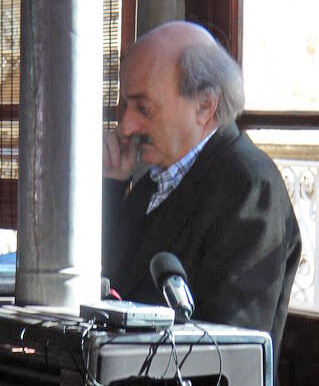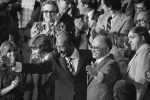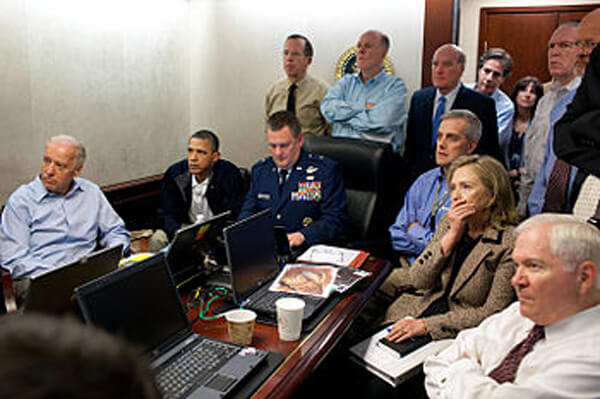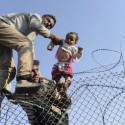By Ali Rizk

Two recently held meetings, one between Hezbollah’s leader Sayyed Hassan Nasrallah and Lebanese Druze leader Walid Jumblatt, and the other between Sayyed Nasrallah and the head of the Lebanese Christian Marada movement Suleiman Franjieh, reflect a sense of urgency amid the rising ISIL regional threat. According to Hezbollah officials, Jumblatts talks with Nasrallah focused on the threat posed by ISIL, whereby the Lebanese Druze leader expressed his fear that the rise of this organization could push the Druze throughout the region into the hands of Israel, believing that such a step would be the only way to preserve themselves from this menace. This was followed by Jumblatts statement that “saying that Hezbollah brought terrorism to Lebanon with its involvement in Syria is incorrect. What is needed is dialogue among all factions to safeguard Lebanon from this obscurantist thought which has come from ignorance.”
The second meeting reflects the growing concern amongst Lebanese Christian figures hailing from the North of Lebanon, about what ISIL might have install for the countries Northern territories. The same Hezbollah officials say that Lebanese Christians from the Northern Lebanese regions of Akkar, Zgharta and Ehden are fearful of attempts by ISIL to establish their emirate in the North and have sought Hezbollah’s help in confronting such a project. It is within this context that Suleiman Franjieh, who hails from the Northern town of Ehden, met with Nasrallah. Indeed, in a recent discussion Franjieh told me that the “sectarian Takfiri project is a danger to all moderates and especially the minorities” and that “Lebanon is part of this project”.
The latest events in Lebanon’s northeastern border town of Arsal clearly reinforce these fears, where for the first time we witnessed a well-armed ISIL actively involved in fighting with the Lebanese army over the control of territories.
Perhaps what causes most concern amongst these Lebanese officials is the “ISIL ideology penetration” into Lebanon. According to senior security officials, during interrogation one terrorist prisoner in Lebanon (of Lebanese nationality) justified his slaughtering of three people in Syria by making the case that this was in line with the teachings of Prophet Muhammad.
Lebanon is estimated to have hundreds of fighters who have joined the armed opposition in Syria, most of them from the Northern Lebanese city of Tripoli. And now, with ISIL becoming the dominant Takfiri force in Syria,(as well as Iraq of course),and the increasing defections of members of Al-Qaeda affiliates to this group, there is a growing danger that these Lebanese fighters will come back from next door, bringing with them the ISIL ideology which believes in slaughtering in the name of religion. It has become known that this ideology differs from that of the core Al-Qaeda, in that it focuses on the internal enemy like “Shiites” and “Christians” and even those Sunnis’ who don’t share or submit to their ideology. Lebanon, therefore, in addition to Iraq, is the most vulnerable country in terms of the danger of the “terrorist blowback”. It is a neighboring country of Syria, and it has the biggest religious diversity of all regional countries, including a Shiite majority and one of the region’s largest Christian communities. This is what makes ISIL’s emergence, as opposed to other groups such as the Free Syrian Army or Al-Nusra, so dangerous in the eyes of Lebanese figures. And it is also why Lebanon seems like the perfect arena for ISIL terrorism.
At the same time Lebanon has witnessed the return of former premier and head of the Lebanese future movement Saad Hariri, after an absence of three years. The return of Hariri, who is Saudi Arabia’s staunch ally in Lebanon, of course reflects a shifting Saudi priority in containing ISIL, at least in Lebanon. Hariri has emphasized moderation in the face of extremism during his visit, which comes after his announcement of a Saudi grant of 1 billion dollars to assist the Lebanese army in fighting terrorism.
Therefore it does appear that regional developments have lead Lebanese leaders to focus on the priority of confronting the terrorism threat.(though there may be differences the means of confronting this threat) This may have came just in time given the atrocities taking place in Iraq.
(Ali Rizk is a veteran journalist based in Beirut, Lebanon. He is Press TV’s chief correspondent in Beirut and has worked in Journalism for over 10 years, including 5 years in Iran. He has written extensively about Iran US ties and about US-Middle East policy under the Obama Administration. Most notably he writes for the Lebanese daily Assafir. His twitter address is: @AlipressRizk. Reach by email at alipress@live.com)
Related articles


- Israelisnipers shooting and killing hospital workers in Gaza - December 11, 2023
- CAIR Condemns Israeli Executions of Wounded, Unarmed Palestinian in West Bank - December 11, 2023
- Arab and Muslim American voters face a “simple choice” between Biden’s inhumanity and Trump’s edgy politics - December 9, 2023





























